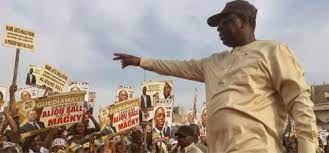The uninhibited liberal Abdoulaye Wade and the Melenchonien socialist Ousmane Sonko would they form an alliance between the carp and the rabbit?
After two democratic alternations in 2000 and 2012, Senegalese democracy is moving up a notch with, a first in the history of this country which has been voting since 1848, a virtual balance of power between the opposition and the power. The result of the vote puts the country of Teranga in the same configuration as Ghana, another great West African democracy with since the 2020 elections, a parliament comprising 137 deputies for the ruling party (New Patriotic Party (NPP) of President Nana Akufo-Addo versus 136 MPs for former President John Mahama’s National Democratic Congress (NDC) who initially contested the results.
In Senegal, at the end of the historic ballot on Sunday, July 31, 2022, the overall result confirms a break with hyper-presidentialism (defined in our view by an executive with an absolute majority in the chamber of legislators) in a democratic atmosphere. against and against some international press headlines. Thus, with 82 deputies, the presidential camp “Benno Bokk Yakaar” comes first but with 42 fewer deputies than five years ago. Conversely, the opposition coalitions “Yewwi Askan Wi”, of the opponent Ousmane Sonko, 47, leader of the party of African Patriots of Senegal for work, ethics and fraternity (PASTEF), and ” Wallu Senegal”, of former President Abdoulaye Wade, 96, founder and leader of the Senegalese Democratic Party (PDS), who returned to the country on the eve of the election, won 56 and 24 seats respectively, or 80 in total for this alliance. Three deputies belonging to other mobilities complete the hemicycle and will therefore be called upon to act as arbiters.
Basically, the question will be how long will the inter-coalition between the carp and the rabbit last? The Wallu of President Abdoulaye Wade is of rather uninhibited liberal allegiance whereas, through his program, focused among other things on the overhaul of mining contracts, a constant speech against multinationals and tax incentives, Ousmane Sonko would rather tend Melenchonian socialist. The points of friction between the two men are numerous, starting with the possible candidacy of Karim Wade for the presidential elections of 2024. The convergence between the two intergenerational leaders remains the desire to block the road to the presidential camp in 2024.
Until then rather vague on the project of a third term that his opponents lend him, President Macky Sall probably knows it better than anyone, over the next two years, any silence on this subject will be held against him. The Senegalese political debate in the short term will not spare the management of hydrocarbon resources (125,000 barrels per day from the end of 2023), the continuation of the pace of investment in infrastructure and alliances and counter- political alliances in a context where the voters sanctioned the “transhumant” both at the local level which took place at the beginning of the year and at these legislative elections. The torrential rains of August 5 in Dakar clearly show that sustainability requires investment in infrastructure and basic services without which everything acquired is fragile.



